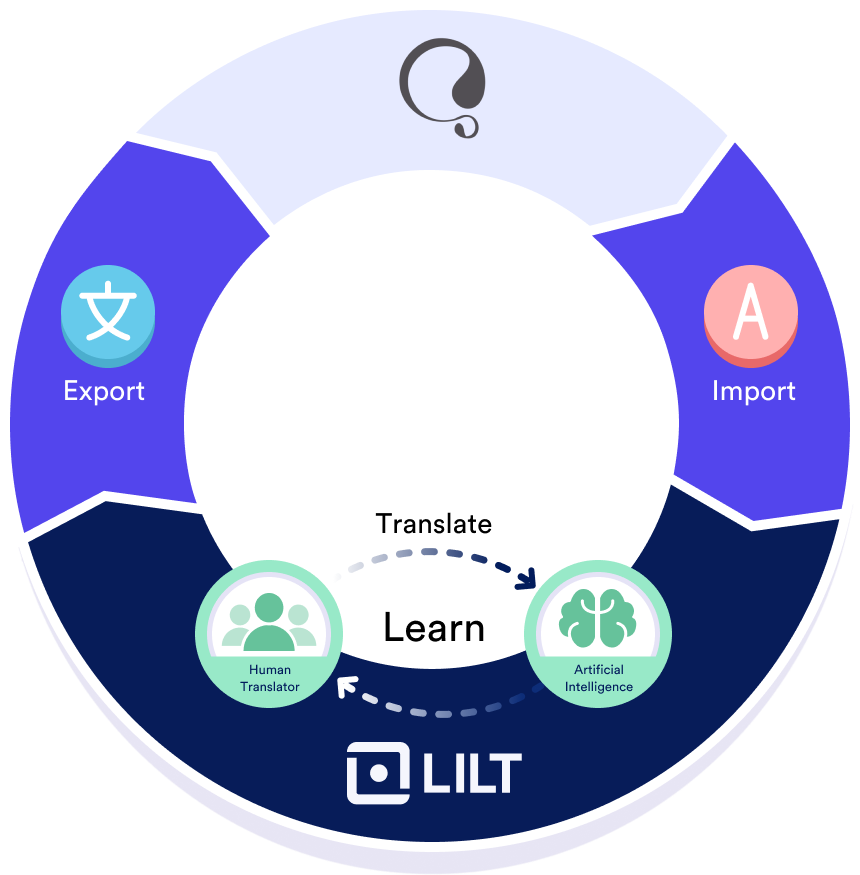Amplifying Government Performance with Generative AI Translation for Enhanced Speed & Scalability: Webinar Recap

Our latest webinar with Lilt’s customer, the Federal Bureau of Investigation (FBI), highlighted the use of generative AI to enhance government performance and translation operations. To kick us off, Jesse Rosenbaum, Vice President of National Security at Lilt, dives into the technology behind Lilt and how AI is enabling increased translation efficiency and scalability.
The session covers the FBI’s journey with language technology, and how the organization has adapted AI to meet content deliverables. David Kim, a Language Technology Program Manager at the FBI, discusses the FBI's language services, the challenges they face, and how they are leveraging AI technology to overcome these challenges.
Whether you watch the full recording or read this recap, you will walk away with a deeper understanding of the role of AI in language. Below are three insightful takeaways from the webinar:
• AI translation provides a powerful tool for streamlining language processes and scaling translation efforts.
• The introduction of generative AI translation has posed new challenges for industries.
• AI translation technology is expected to evolve and be adopted more widely in the future.
.png?width=200&height=200&name=Illustration%20-%20Gov(Ad).png)
.png?width=200&height=200&name=Illustration%20-%20Hero%20AI%20(9).png)

Takeaway 1: AI translation provides a powerful tool for streamlining language processes and scaling translation efforts.
"AI translation enables the streamlining of language processes, increasing efficiency, and scaling translation beyond what was previously possible."
 Jesse Rosenbaum
Jesse Rosenbaum
VP National Security
The webinar highlighted the significant role that AI plays in language translation, particularly in industries and government agencies that deal with a vast amount of multilingual content. Rosenbaum emphasized the impact of AI, saying it was "revolutionizing the way industry and government organizations are approaching language translation."
Kim echoed this sentiment, noting how AI translation tools have significantly helped the FBI by enabling non-language enabled personnel to process and make sense of foreign language content.
Kim further explained that the agency uses AI translation not only to translate internal documents but also to help inform the public and communicate with foreign partners. He emphasized, however, that every external dissemination goes through a rigorous review by at least two translators, ensuring the accuracy of the translations.
Takeaway 2: The introduction of generative AI translation has posed new challenges for industries.
The use of AI translation has shifted the way the FBI operates, increasing translator efficiency and reducing workload. While AI translation has significantly transformed language services, it has also presented new challenges, particularly in the realm of data security and confidentiality. The speakers discussed how the FBI, for instance, ensures security and compliance when using AI services.
Kim mentioned that one of their criteria for an AI-enabled translation solution is its ability to pass through their internal security measures. He also noted how they purge data regularly, ensuring that sensitive information is not stored indefinitely. "The data that's fed into or uploaded into this project source documents are in the Lilt system on a temporary basis. So we purge the data on a regular basis," Kim explained.
Takeaway 3: AI translation technology is expected to evolve and be adopted more widely in the future.
"The level of human resources that we can fund and hire is at a static number and does not grow at the same rate of growth for the amount of data that we generate as a global society."
 David Kim
David Kim
Language Technology Program Manager
The discussion also touched on the future of AI translation technology, with both speakers agreeing that it will continue to evolve and be adopted more widely. Rosenbaum explained that Lilt has already developed a product called Lilt Create, which uses large language models to generate multilingual, on-brand content from scratch.
Kim, meanwhile, highlighted the importance of having a coherent strategy for utilizing AI translation technology effectively. He noted how the FBI has started to focus on this aspect more recently. "Because of diversity and the lack of repetitiveness in our source documents, the variety introduces challenges where you will not necessarily get a match from your own translation memory. (...) those were some initial growing pains I distinctly recall," Kim said.
The field of language translation has seen significant transformations in recent years, and the use of AI technology is one of the key drivers behind these changes. Overall, the session provided valuable insights into how generative AI translation is revolutionizing government performance and the potential benefits and challenges that come with this technology.
The ability of generative AI translation to handle large volumes of content simultaneously provides an unprecedented advantage to government agencies dealing with massive datasets. Whether it’s official documents, legal contracts, or diplomatic communications, AI-powered translation solutions enhance overall productivity and increase the responsiveness of government departments, elevating the team’s productivity and effectiveness.
With the assistance of AI, government agencies and organizations can translate content faster and more efficiently than ever before. Through our innovative approach to localization with AI, our technologies greatly improve translation speed and accuracy. To learn more about Lilt's platform and security measures, check out our government page.
.png?width=623&height=76&name=Lilt-Blog%20CTA%20(1).png)


-%20Dark%20(17).png)